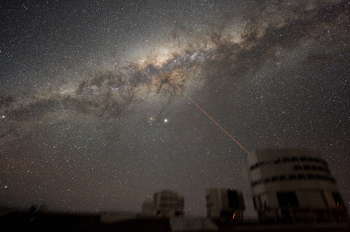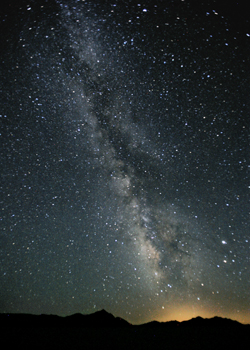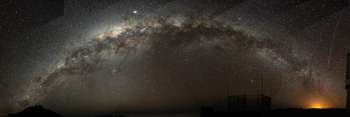The "Great Wind" of God
By Dan Clendenin
For Sunday January 11, 2015
Lectionary Readings (Revised Common Lectionary, Year B)
Genesis 1:1–5
Psalm 29
Acts 19:1–7
Mark 1:4–11
When I was in seminary thirty-five years ago, I took two years of Greek and one year of Hebrew for my Masters of Divinity degree (the standard degree for ordination). Hebrew was especially hard, with its exotic alphabet and text that read from right to left. I've forgotten my Hebrew, but there's a phrase from the second verse in the Bible that I learned back then that I couldn't forget if I tried.
Genesis 1:2 reads that the primordial soup of pre-creation was tohu wa-bohu. That was fun to say out loud as a student — it rhymed, it was phonetically simple, and it was one of the few things that I could pronounce without mangling the language. It also made you feel like you enjoyed some mystical knowledge about creation.
Tohu wa-bohu. The stuff of creation was a formless or unformed waste. A shapeless, futile and empty void. Darkness and desolation covered the watery deep. Things were chaotic.
 |
Our Milky Way galaxy seen from the Paranal Observatory in Chile. |
But then there was a "great wind" ("ruach elohim") that blew over the waters. The simplest way to read this is a "strong and stormy wind," but interpreters have never been able to resist the translation that the ruach elohim is the very wind, breath, or Spirit of the living God.
Like a tender mother, God's Spirit hovers, broods, or flutters over the watery chaos. The word rachaph is used only two other time in the Hebrew Old Testament. In Deuteronomy 32:11, God says that when he found his people in a "howling wasteland," he shielded or guarded them — "like an eagle that stirs up its nest and hovers over its young."
The gospel and the epistle for this week remind us that the Spirit of God broods and blows over our own little lives just like he does over all creation and history. As with the original creation of the whole cosmos, so now with the recreation of my own life.
At the baptism of Jesus, Mark writes that "the Spirit descended on him like a dove."
And when Paul baptized twelve clueless people in Ephesus, Luke writes that "the Holy Spirit came on them."
The Spirit of God forms the formless. He breathes spirit into matter. He creates purpose, order and meaning out of the chaos. He fills the empty void with beauty and goodness. He turns darkness into light, night into day, the evening into a new morning. God calls those things that don't exist into existence.
That's what the Spirit did in creation, and that's what he does in my redemption.
Hildegard of Bingen (1098–1179) was one of the most Spirit-inspired mothers of the church. In an age when life expectancy was about forty, she lived a remarkably long and incredibly productive life. The Benedictine abbess founded two convents, conducted four preaching tours, penned at least 400 letters, wrote music and a morality play, supervised illuminated manuscripts, cared for her fellow sisters, and wrote three major theological treatises based upon her famous visions.
All this despite her pronounced feelings of self-doubt, the lack of formal schooling, chronic illnesses that probably included depression and migraine headaches, and the subservient roles assigned to women by a male-dominated church and culture.
Hildegard was born the youngest of ten children to an aristocratic family that lived near Mainz. She started having what she later concluded were divine visions as early as age three. When she was eight her parents dedicated her to the religious life, and at age fourteen she entered the St. Disibod Abbey at Disibodenberg. Until her death almost seventy years later, she devoted herself to the life of a Benedictine nun.
After keeping her visions to herself for decades, when she was forty-two Hildegard says that God told her to write what she had seen and heard: "So now you must give others an intelligible account of what you see with your inner eye and what you hear with your inner ear. Your testimony will help them. As a result, others will learn how to know their Creator. They'll no longer refuse to adore God."
Here is Hildegard of Bingen on the brooding Spirit of God.
 |
Our Milky Way galaxy seen from the Black Rock Desert, Nevada. |
O comforting fire of Spirit,
Life, within the very Life of all Creation.
Holy you are in giving life to All.Holy you are in anointing
those who are not whole;
Holy you are in cleansing
a festering wound.O sacred breath,
O fire of love,
O sweetest taste in my breast
which fills my heart
with a fine aroma of virtues.O most pure fountain
through whom it is known
that God has united strangers
and inquired after the lost.O breastplate of life
and hope of uniting
all members as One,
O sword-belt of honor,
enfold those who offer blessing.Care for those
who are imprisoned by the enemy
and dissolve the bonds of those
whom Divinity wishes to save.O mightiest path which penetrates All,
from the height to every Earthly abyss,
you compose All, you unite All.Through you clouds stream, ether flies,
stones gain moisture,
waters become streams,
and the earth exudes Life.You always draw out knowledge,
bringing joy through Wisdom's inspiration.Therefore, praise be to you
who are the sound of praise
and the greatest prize of Life,
who are hope and richest honor
bequeathing the reward of Light.
 |
Our Milky Way galaxy seen from Chile. |
Fr. George Montague reminds us that God's Spirit broods over the mess and chaos of our own lives. "There is no light, and we are floating about like a cork lost at sea. We try to fight it, to no avail. We try to flee, but there is no exit. What do we do? We fall on our knees and ask the Holy Spirit to hover over our mess, to embrace it lovingly and prepare it for the light of God’s word. If any of our chaotic depths surface, we then turn them over to the Lord."
These first few verses from Genesis remind us that every life and the entire cosmos come from God and not from nothing. They affirm that despite the chaos and darkness around us, creation is good and beautiful. That's because the Spirit of God broods and hovers over us all like a tender mother.
Image credits: (1–3) Wikipedia.org.





